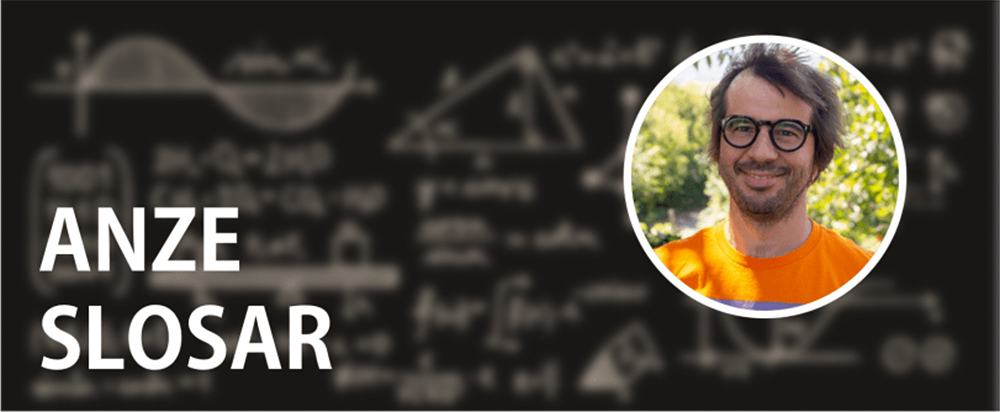Anže Slosar: Then and Now
September 14, 2021
The following story was originally published by the U.S. Department of Energy’s Office of Science.
What did the 2011 Early Career Award allow you to do?
I received the Early Career Award soon after becoming a tenure-track physicist at the Brookhaven National Laboratory. This award enabled me to pursue a novel technique for mapping the structures in the Universe, where we used light from very distant cosmic objects (called quasars) as a backlight to illuminate the structure in the universe in front of them.
While this technique has been known for decades, scientists had only used it on a handful of quasars. A once-revolutionary DOE experiment, BOSS or Baryon Oscillation Spectroscopic Survey, has measured spectra from tens of thousands of objects. This data allowed us to scale up this technique to unprecedented accuracy. With collaborators, we demonstrated the feasibility of this technique on BOSS data and learned about the physics of dark energy at very high distances corresponding to very large, previously unattainable look-back times.
The universe was supposed to have very little dark energy – the mysterious component of the universe responsible for its accelerated expansion. Our measurements have confirmed this picture, in which dark energy is simply an inert property of space. It drives an accelerated expansion of the universe, making it a truly dark energy.
The Early Career award gave me intellectual freedom to work on this and other problems and to get involved in the vision for the long-term DOE planning and supported my progression to the Group Leader for Cosmology and Astrophysics at the Brookhaven National Laboratory. I also am currently the Analysis Coordinator for the Legacy Survey of Space and Time Dark Energy Science Collaboration, which will analyze data from the Vera Rubin Observatory, the next-generation, dark energy experiment.
DOE’s unique cradle-to-grave approach to talent development has been instrumental in developing my skills and helping me become a successful and productive experimental cosmologist.
About:
Anže Slosar is a Staff Scientist in the Physics Department and the Group Leader for Cosmology and Astrophysics at the Brookhaven National Laboratory.
Supporting the DOE SC Mission:
The Early Career Research Program provides financial support that is foundational to early career investigators, enabling them to define and direct independent research in areas important to DOE missions. The development of outstanding scientists and research leaders is of paramount importance to the Department of Energy Office of Science. By investing in the next generation of researchers, the Office of Science champions lifelong careers in discovery science.
For more information, please go to the Early Career Research Program.
The 2011 Project Abstract:
Cosmology with the Lyman-Alpha Forest
This project will investigate the nature of dark energy, the mysterious component of the universe responsible for its accelerated expansion, using quasars, which are the brightest objects in the universe. Using data from the Baryon Oscillation Spectroscopic Survey (BOSS) experiment, the three-dimensional structures in the early universe will be determined by measuring the shadows that intervening neutral hydrogen in space casts on the spectra of quasars, known as the Lyman-alpha forest.
Such data offer a unique probe of the distant universe and will also provide constraints on dark matter, neutrinos, and cosmic inflation. A comprehensive framework will be built based on novel and robust techniques to analyze the Lyman-alpha forest spectra, with strong emphasis on understanding the systematic errors arising from astrophysical and instrumental effects. This will result in new constraints on cosmological parameters and pave the way for the future experiments studying the nature of dark energy.
Resources:
Anže Slosar, et al., “The Lyman-α forest in three dimensions: measurements of large scale flux correlations from BOSS 1st-year data.” Journal of Cosmology and Astroparticle Physics 09, 001 (2011). [DOI: 10.1088/1475-7516/2011/09/001]
Anže Slosar, et al., “Measurement of baryon acoustic oscillations in the Lyman-α forest fluctuations in BOSS data release 9.” Journal of Cosmology and Astroparticle Physics 04, 026, (2013). [DOI: 10.1088/1475-7516/2013/04/026]
Éric Aubourg, et al., “Cosmological implications of baryon acoustic oscillation measurements.” Physical Review D 92, 123516, (2015). [DOI: 10.1103/PhysRevD.92.123516]
DOE EXPLAINS… offers straightforward explanations of key words and concepts in fundamental science. It also describes how these concepts apply to the work that the Department of Energy’s Office of Science conducts as it helps the United States excel in research across the scientific spectrum. For more information on dark energy and DOE’s research in this area, please go to “DOE Explains…Dark Energy.”
Additional profiles of the 2010 Early Career Award recipients can be found at /science/listings/early-career-program.
The Office of Science is the single largest supporter of basic research in the physical sciences in the United States and is working to address some of the most pressing challenges of our time. For more information, please visit www.energy.gov/science.
2021-19126 | INT/EXT | Newsroom










